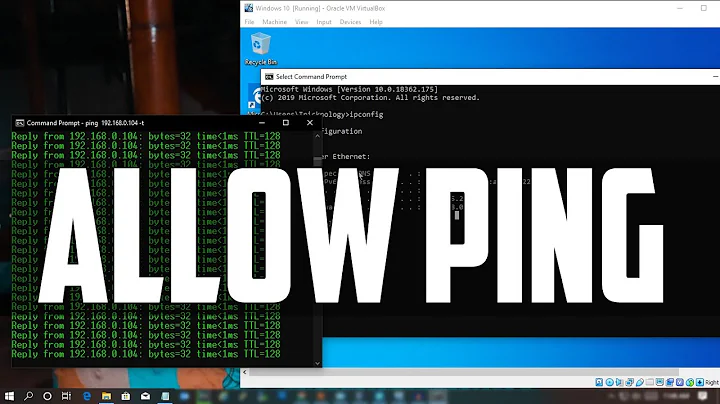ping response "Request timed out." vs "Destination Host unreachable"
Solution 1
Destination Host Unreachable
This message indicates one of two problems: either the local system has no route to the desired destination, or a remote router reports that it has no route to the destination.
If the message is simply "Destination Host Unreachable," then there is no route from the local system, and the packets to be sent were never put on the wire.
If the message is "Reply From < IP address >: Destination Host Unreachable," then the routing problem occurred at a remote router, whose address is indicated by the "< IP address >" field.
Request Timed Out
This message indicates that no Echo Reply messages were received within the default time of 1 second. This can be due to many different causes; the most common include network congestion, failure of the ARP request, packet filtering, routing error, or a silent discard.
For more info Refer: http://technet.microsoft.com/en-us/library/cc940095.aspx
Solution 2
Request timed out means that the local host did not receive a response from the destination host, but it was able to reach it. Destination host unreachable means that there was no valid route to the requested host.
Solution 3
As I understand it, "request timeout" means the ICMP packet reached from one host to the other host but the reply could not reach the requesting host. There may be more packet loss or some physical issue. "destination host unreachable" means there is no proper route defined between two hosts.
Solution 4
As khaos said, a destination unreachable could also mean that something is blocking the way from or to your destination. For example an ACL that filters bad IP addresses.
Solution 5
Put very simply, request timeout means there was no response whereas destination unreachable may mean the address specified does not exist i.e. you typed in the wrong IP address.
Related videos on Youtube
Suresh Kumar Veluswamy
An IT professional with experience in Project Management, Software Architecture, and Software Development.
Updated on July 08, 2022Comments
-
 Suresh Kumar Veluswamy almost 2 years
Suresh Kumar Veluswamy almost 2 yearsWhen I ping an IP address, what is the difference between Request timed out and Destination host unreachable returned from the command?
-
 Komengem almost 10 yearsSo how do you fix this, "If the message is "Reply From < IP address >: Destination Host Unreachable," then the routing problem occurred at a remote router, whose address is indicated by the "< IP address >" field."
Komengem almost 10 yearsSo how do you fix this, "If the message is "Reply From < IP address >: Destination Host Unreachable," then the routing problem occurred at a remote router, whose address is indicated by the "< IP address >" field." -
user2924019 over 7 yearsWhat does it mean if you get a mix of both replies?
-
sanderd17 about 7 yearsWhat does it mean when you get "Reply From < IP address >: Destination Host Unreachable,", with <IP address> being the local ip address of the machine you're pinging from (not the gateway or router or ...)?
-
Matt about 7 years@sanderd17 I have the same issue, did you figure it out? Trying to ping a new Centos 7 install from a Windows machine, I get "Reply From <windows IP>: Destination Host Unreachable"
-
sanderd17 about 7 years@Matt IIRC, it just means a problem with the DNS. Could still be your router, or the lmhosts config file. The problem isn't necessary with your computer.
-
Matt about 7 yearsThanks @sanderd17, in case anyone else lands here I figured it out: My Linux server was configured with an Ethernet interface with static IP (which I pulled the cable out of once wifi was working) and a Wireless interface that was actually connected. Because of the static IP the Linux server saw the Ethernet inteface as still enabled even though it didn't have a cable any more, and (I think) was trying to reply to my Wireless ping on the Ethernet interface... or something like that. Disabling the Ethernet interface fixed it, anyway!
-
 brokenfoot almost 7 yearsTo check if there is no route on the local host to the remote, ping the remote client
brokenfoot almost 7 yearsTo check if there is no route on the local host to the remote, ping the remote clientping <remote-host-ip>, and then check ARP entryarpon the local host if it got resolved. If it isincompletefor the remote-host-ip, then it means the ping ICMP packet never left the local host machine, the local machine doesn't know where to send the packet. -
 Belekz over 6 yearsI'm having troubles to connect to an remote device from my virtual machine. The ping from the host pc to the remote device was succesfull, but when I ping from the virtual device to the remote device I get the "replay from...Destination host unreachable" and like @brokenfoot said, the ARP table inside the virtual machine has no entry with the remote IP. How to fix?
Belekz over 6 yearsI'm having troubles to connect to an remote device from my virtual machine. The ping from the host pc to the remote device was succesfull, but when I ping from the virtual device to the remote device I get the "replay from...Destination host unreachable" and like @brokenfoot said, the ARP table inside the virtual machine has no entry with the remote IP. How to fix? -
vanowm almost 4 yearsIn my case the <IP address> is ip of the pc I ran the ping from, so calling it "remote" doesn't make sense. And it's not consistent either, one run it pings just fine, next run it shows host unreachable.

![Windows server| ping destination host unreachable server 2008 | Fix [New 2015]](https://i.ytimg.com/vi/uuxQ3IS4ayA/hqdefault.jpg?sqp=-oaymwEcCOADEI4CSFXyq4qpAw4IARUAAIhCGAFwAcABBg==&rs=AOn4CLBX_kd7nSM6bx_7dWYsuHXGtYsKiw)

![Request Timed Out Fix Windows 10/8/7 - [2021]](https://i.ytimg.com/vi/pMIvMdbsc0M/hq720.jpg?sqp=-oaymwEcCNAFEJQDSFXyq4qpAw4IARUAAIhCGAFwAcABBg==&rs=AOn4CLB4ViuvFmzPI4_PC1P074RQAHE8bw)


